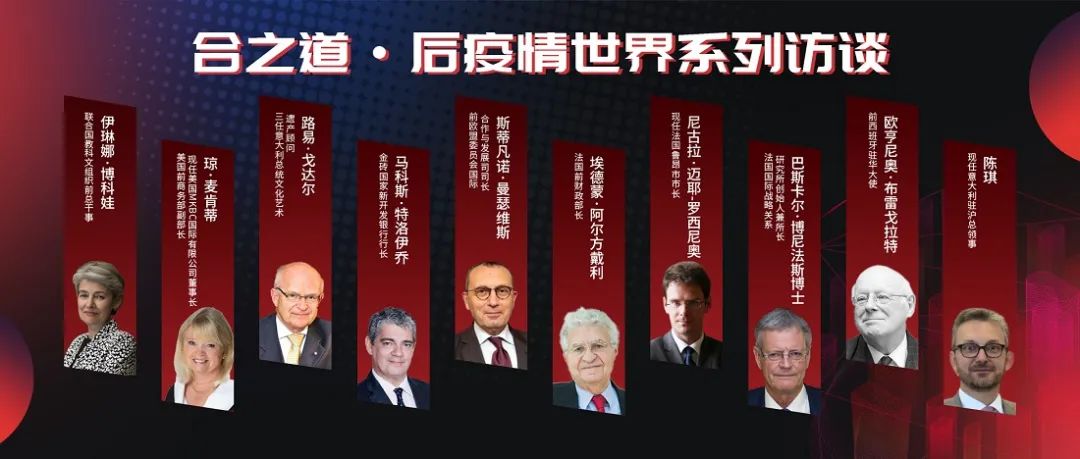合之道·訪談 | 里昂對話聯(lián)合國教科文組織總干事
來源:法國里昂商學院時間:2021-12-08

進入“后新冠疫情時代”,, 全球化發(fā)展面臨著變局,,需要全球共同努力不斷開拓合作,,促進經(jīng)濟增長和社會發(fā)展的新局。
當我們不得不面對疫情時,“韌性”的概念非常恰當?shù)馗爬宋覀兯仨毦邆涞钠焚|,,如今我們要做的是以更系統(tǒng)性的方式探索“合作”的概念,。當下, 協(xié)同發(fā)展是大勢所趨,,能否切實開展深化、平等地合作,,在當前來看應該是合作深入推進并實現(xiàn)互利共贏的關鍵,。中歐論壇創(chuàng)始人、法國里昂商學院高級顧問高大偉先生在準備《中國與世界第二卷》期間,,獨家對話眾多知名政客,、學者、企業(yè)家,,就疫情后的合作發(fā)展法則展開談論,。

近期我們將陸續(xù)推出為期十期的《合之道》系列訪談,,繼《竹之韌》后的在后疫情時代背景下的高端訪談。

伊琳娜·博科娃 Irina Bokova
聯(lián)合國教科文組織前總干事
Former Director-General of UNESCO
2009年至2017年,,伊琳娜·博科娃曾連任兩屆聯(lián)合國教科文組織總干事,。
她是該組織首位女性領導人和首位東歐領導人。
Irina Bokova has been two terms the Director-General of UNESCO from 2009 to 2017.
She is the first woman and the first Eastern European to lead the Organization.
高大偉:伊琳娜,,很高興能有機會與你進行對話。此時你在巴黎,,身后有許多書,。我們很高興能在上海。你非常了解上海,,肯定看出來了我們背后是陸家嘴,。伊琳娜,2020年,,我們看到了越來越多的不確定因素,。當我們不得不面對疫情時,我認為“韌性”的概念非常恰當?shù)馗爬宋覀兯仨毦邆涞钠焚|,。但現(xiàn)在我們已經(jīng)進入了“后新冠肺炎疫情時代”,,從某種程度上看,我們還只能說“后疫情時代” ,。而現(xiàn)在我們要做的是以更系統(tǒng)性的方式探索“合作”的概念 ,。因此我的第一個問題是 ,伊琳娜 ,,你如何理解合作,,為什么合作對當今世界而言如此重要。
DG: Irina, it's really a great pleasure to have the chance to have this conversation with you. You are in Paris with a lot of books, and we have the great pleasure to be in Shanghai. In our back, of course, you know Shanghai very well, this is Lujiazui. Of course, Irina, 2020 is a year in which we have seen the increase of uncertainties. And when we had to face the pandemic, I think the notion of resilience was very much apt to describe what we had to do. But now we have entered another phase in this post-pandemic world or post-COVID-19 world, to a certain extent, we can use “post” only. And we think that the concept of collaboration has to be explored in a more systematic way. Therefore, my first question, Irina, would be about your understanding of collaboration, and why do you think collaboration is so important for our world today?
伊琳娜·博科娃: 大偉,,2020年本應是非常重要的一年,。今年是聯(lián)合國成立75周年 ,是聯(lián)合國具有里程碑意義的,?!?030年可持續(xù)發(fā)展議程》通過5周年, 是《巴黎氣候變化協(xié)定》通過5周年,, 而且今年還是另一項具有里程碑意義的會議,, 即在北京舉行的謀求和平與發(fā)展的世界婦女大會召開和《行動綱領》簽署25周年。今年本應是我們就多邊主義方面所取得的重要成就,, 回顧過去并積極展望未來的一年 ,。然而, 2020年,, 新冠肺炎疫情爆發(fā),??梢哉f, 2020年是迫切需要更多多邊主義的一年,, 是迫切需要國際合作的一年,。2020年呼吁我們更加共享和團結, 幫助最弱勢群體,, 最終實現(xiàn)和平,, 實現(xiàn)可持續(xù)發(fā)展, 提高韌性,。
因此,, 我非常擔憂。因為我看到了一些破壞多邊主義的行動,, 對聯(lián)合國和世衛(wèi)組織的攻擊,, 退出聯(lián)合國教科文組織等其他國際組織的行為。我相信,, 要應對今天的挑戰(zhàn),, 應對人類所面臨的令人沮喪的問題, 我們所有人都需要更多的多邊主義 ,,而非更少,。即便我們只以這場疫情為例, 病毒會攻擊所有人,, 無論貧富,, 可能對貧窮人口的沖擊更大。病毒是不分國界的,, 也不分宗教,, 政治秩序, 信仰或文明,, 在這場斗爭中我們是一體的,。
當我看到有人決定退出這個多邊體系時, 當我看到有人試圖采取單邊主義的方式來解決問題時,, 我非常擔心,。因為這不是當今世界人類和世界所需要的,我們需要國際合作來實現(xiàn)可持續(xù)發(fā)展,, 實現(xiàn)《巴黎氣候協(xié)定》所設定的目標,, 停止破壞生物多樣性, 保衛(wèi)我們的民族 ,,并最終讓援助惠及最弱勢群體。這是我們今天所面臨的主要任務,。沒有一個國家,, 即便是世界上最強大的國家 ,,可以獨自取勝。
IB: You know, David, 2020 was supposed to be a very important year. It is the 75th anniversary of the United Nations. It is five years after the adoption of the landmark Sustainable Development Agenda 2030 by the United Nations. It is five years after the Paris Climate Agreement, 25 years after the landmark, again, historic conference in Beijing on women, peace, and development, and the Beijing Plan of Action. This was supposed to be a year of taking stock of and looking into the future with optimism, based on this extraordinary achievement of multilateralism. Now, 2020 is the year of the COVID. But 2020 also, I would say, is the year which cries out for more multilateralism. It cries out for international cooperation. It cries out for sharing, for solidarity, for reaching out to the most vulnerable, and at the end of the day, for peace and for more sustainable development and resilience.
So, I’m worried, I'm very worried looking at some attempts to undermine multilateralism, attacks on the United Nations, on the World Health Organization, retreating from major international organizations like UNESCO and some others. And I do believe that challenges today, the depressing problems that we have as humanity, all of us, need more multilateralism and not less. And even if you take only the pandemic, the virus hits everybody, the rich and the poor, maybe more the poor, but it does not know geographical borders. It does not recognize religions, political orders, beliefs, civilizations. We are all united in this struggle.
When I see this withdrawal from this multilateral system, when I see attempts to solve problems unilaterally, I'm worried because this is not what humanity and the world needs today. We need international cooperation to reach sustainability, to achieve the targets of the Paris Climate Agreement, to stop undermining biodiversity, and to protect our nation, and at the end of the day, to reach out to the most vulnerable in this world. So, this is the main task today. And not a single country, be the most powerful in the world, can achieve this unilaterally.
高大偉:非常感謝,, 伊琳娜,。你讓我們想起過去75年的風雨歷程, 以及我們?nèi)绾卧?945年共同創(chuàng)立聯(lián)合國,, 建立布雷頓森林體系等,。事實上, 正是得益于多邊主義,, 我們才能自二戰(zhàn)結束以來實現(xiàn)如此巨大的進步,。在這種情況下, 伊琳娜 ,,你如何看待聯(lián)合國為實現(xiàn)發(fā)展與和平,, 在發(fā)揚合作精神方面所扮演的角色。
DG: Thank you so much, Irina. You reminded us what has been happening for 75 years and how we built all together in 1945 the UN system, what happened at Bretton Woods and so on, and the fact that thanks to multilateralism, we have had such progress across the planet, by the way, since the end of the Second World War. So, in that context, Irina, how do you see the role of the UN to foster this collaborative spirit for development and peace?
伊琳娜·博科娃: 我仍然相信聯(lián)合國是唯一一個可以推動國際合作的通用平臺,。即使它可能并不完美,。聯(lián)合國早期的一位秘書長達格·哈馬舍爾德曾在幾十年前說過, 聯(lián)合國的成立并不是為了引領我們走向天堂,, 而是為了把我們從地獄中解救出來,。這是所有會員國應該努力實現(xiàn)的目標??梢哉f,, 聯(lián)合國獲得了無數(shù)成就 ,不勝枚舉 ,。但我也相信 ,,世界需要政治領導人們在聯(lián)合國框架下達成新的社會經(jīng)濟和政治協(xié)定 ,退出并不是解決問題的答案,, 加強,、 支持和改革才是正確的應對之策 。我相信《聯(lián)合國憲章》仍具有現(xiàn)實意義,, 聯(lián)合國體系在全球范圍內(nèi)的標準設定仍具有現(xiàn)實意義,。因此, 與不參與和攻擊相反,, 我認為一場坦誠的辯論,, 探討人類的未來, 探討在此框架內(nèi)亟待解決的挑戰(zhàn),, 才是我們今天所需要的,。
IB: Istill believe that the UN is the only universal platform for international cooperation. It may not be ideal. Dag Hammarskj?ld, one of the first Secretary Generals of the United Nations, was saying decades ago that the United Nations was not created to take us to heaven, but to save us from hell, and this is where all the efforts of the member states of the United Nations should be aimed at. There are so many, I would say, achievements of the United Nations, and I cannot enumerate all of them. But I do believe that we need a new social, economic and political compact in the world by political leaders, based and within the framework of the United Nations. Withdrawal is not the answer. Strengthening, supporting, reforming is the true answer to what is happening. I do believe still that the Charter of the United Nations is relevant. The normative setting of the United Nations system globally is still very relevant. So, instead of sitting outside and attacking, I believe incite a true and honest debate about the future of humanity, about the pressing challenges within this framework is what is needed nowadays.
高大偉:非常感謝, 你提到了1945年。我們現(xiàn)在到了2020年 ,,世界發(fā)生了天翻地覆的變化,。2020年與1945年最大的不同之一在于中國的角色, 你非常了解中國 ,,因為你來過中國很多很多次了,。事實上, 你一直在見證一些人所說的中華復興,, 這是我的第三個也是最后一個問題,, 伊琳娜。當你擔任聯(lián)合國教科文組織總干事時 你提出了一個我認為非常重要的概念,, “新人文主義” ,,它在我們對話的當下仍具有重要意義。因此我想問的是 ,,你認為21世紀中華復興將如何推動新人文主義,, 為和平與發(fā)展作貢獻?
DG: Thank you very much. You mentioned 1945. Of course, we are in 2020, and the world has changed tremendously. And one of the big differences between 2020 and 1945 is the role of China, a country that you know so well from within, because you came to China many, many, many times. In fact, you have been witnessing what some people call the Chinese renaissance. And that would be my third and last question, Irina. When you have been the Director-General of UNESCO, you have been developing what I consider to be an extremely important notion, the notion of new humanism, a notion actually which is still very relevant at the moment we have this conversation. Therefore, I would like to ask, how do you see the Chinese renaissance in the 21st century, contributing to this much needed new humanism for peace and development?
伊琳娜·博科娃: 謝謝你提到我的堅定信念 ,,2009年我當選為聯(lián)合國教科文組織的總干事,, 當時金融危機剛剛發(fā)生 。我看到了這場危機給人民,, 給教育體系 ,,給健康和平等問題帶來的嚴重后果。今天我更加堅信,, 我們需要采取這種方式來應對全球面臨的問題 ,,中國在過去幾十年中為人類發(fā)展這一理念做出了非凡的貢獻。
我想提到一點,, 根據(jù)聯(lián)合國開發(fā)計劃署在2009年發(fā)布的《人類發(fā)展報告》 發(fā)布日期,,恰逢新中國成立70周年, 中國是唯一一個在過去四十年中從低人類發(fā)展水平跨越到高人類發(fā)展水平的國家,。事實上,, 自1990年以來, 中國已使7億多貧困人口成功脫貧 ,。中國也為當前實現(xiàn)可持續(xù)發(fā)展目標提供了典范,。
從另一方面看, 在我任職于聯(lián)合國教科文組織的過程中,, 引起我強烈共鳴的是中國對文化的重視 ,。可以說 ,,中國將傳統(tǒng),、歷史與現(xiàn)代融為一體。我認為這正是當今世界所需要的, 中國相信保護文化遺產(chǎn)的重要性,。目前中國列入《世界遺產(chǎn)名錄》的世界遺產(chǎn)總數(shù)達到55處,, 居世界第一,, 同時也重視非物質文化遺產(chǎn)和傳統(tǒng)文化的保護,。這是一個很好的例子 。說明一個國家 ,,一個民族覺醒時,, 是通過文化 ,通過對多樣性和文化深深的信念和尊重而實現(xiàn)覺醒的,。這是最能體現(xiàn)人文主義的方式,。我當然也會經(jīng)常引用孔子關于人文主義的名言, 他主張 ,,多樣性最為珍貴 ,,和諧能為人類帶來價值 。我認為 ,,這個強有力的信息再次堅定了我們的信念 ,,人類生活在多元化的世界中, 我希望有一天可以實現(xiàn)和諧共處,。
IB: IB: Thank you very much for mentioning my deep belief. When I was elected at UNESCO in 2009, it was immediately after the financial crisis. And I could see the terrible consequences of this crisis on people, on education systems, on health and on equalities. Today, even I'm a stronger believer in the need for this type of approach toward solving the problems in the world. And what China has been contributing in the last decades to this notion of human development is extraordinary.
Let me just mention that China is the only country in the world, according to the last Human Development Report of the United Nations system, published coincided with the 70th anniversary of the establishment of the People's Republic of China, that China is the only country that in the span just of 40 years, reached an index of high human development index, starting from a very low human development index. In fact, China lifted out of poverty more than 700 million people since 1990. And today, it gives an example also of achieving the Sustainable Development Goals.
But the other aspect, and of course, it resonates very deeply with me from my experience of UNESCO, is also Chinese belief in culture. This Chinese, I would say, reconciliation of heritage, of history with modernity. And I think this is what the world needs today. Believing in protection of heritage, China nowadays has the most heritage sites inscribed on the World Heritage List, is number one, 55 heritage sites, protecting also the intangible heritage, the tradition. It's a wonderful example that when a country, when a people awakens up, it is through culture, it is through this deep, I would say, belief and respect for diversity and for culture. And this is the most humanistic, I would say, approach. I, of course, have often quoted many of Confucius ideas about humanism. He said that diversity is most precious and that harmony also is what brings value to human beings. I think this is a very strong message nowadays in strengthening, once again, our belief that we are one single humanity living in diversity, and I hope one day in harmony.
高大偉:非常感謝,, 你所提到的內(nèi)容非常重要, 伊琳娜,。當然 ,,中國是一個政治實體, 也是一個巨大的經(jīng)濟體 ,。但重要的是要記住中國還是一個古老而又鮮活的文明,。因此, 中國在推動你提出的新人文主義主張方面扮演了至關重要的角色 ,。你和我,, 我們都相信進步。事實上,, 世界已經(jīng)取得了很多很多進步,。你提到了貧困, 女性地位,, 環(huán)境問題,。當然, 這個世界并不完美,, 我們需要繼續(xù)進步,。在我看來, 如果要繼續(xù)進步, 我們不僅需要創(chuàng)新精神,, 還需要合作精神,。在這一背景下, 你的工作極為關鍵,, 不可或缺,。可以說,, 聯(lián)合國教科文組織的工作亦是如此 ,。因此, 伊琳娜,, 非常感謝你和我們對話,, 也感謝你能與許多其他領導人一道, 為建立一個更具協(xié)作性和合作性的世界所付出的努力,, 謝謝,。
DG: Thank you very much. This is so important what you just said, Irina. That is, of course, China is a political entity, of course, it's a massive economy, but it is very important to remember that it is both an ancient and living civilization. And as such, it has a very important role to play to foster the new humanism you have tried to defend and that you are defending every day. I think, you and I, we believe in progress. Actually, the world has been progressing a lot, a lot. You spoke about poverty. You spoke about the status of women. You spoke about the environment. Of course, this is not perfect, and we need to go on to progress. It seems to me that if one wants to continue the progress, we would need also to foster not only the spirit of innovation, but also the spirit of collaboration. And in that context, your work is absolutely key, indispensable, I would say, as the work of UNESCO. So, thank you very much for your time, Irina, and to push with so many also other leaders for a world, a more collaborative, cooperative world. Thank you.
伊琳娜·博科娃: 謝謝你,大偉,。
IB: Thank you very much, David.

